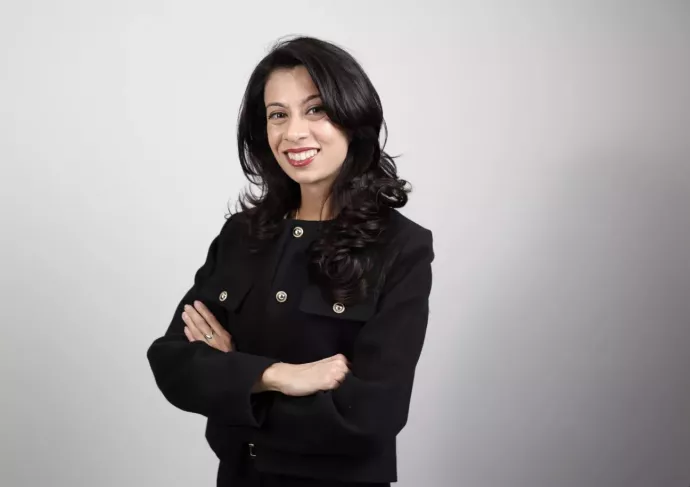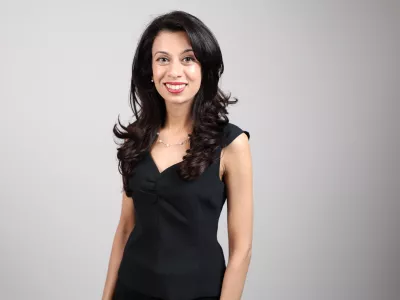
From numbers to narratives: Priyanka Sambhi's journey in forensic accounting
When most people think of accounting, the image of spreadsheets and tax filings might come to mind. But for Priyanka Sambhi, a 2023 graduate of the University of Toronto’s Master of Forensic Accounting (MFAcc) program, accounting is less about numbers and more about narratives, uncovering hidden stories behind financial statements and following the breadcrumbs of deception. “Forensic accounting is akin to being the ‘Sherlock Holmes’ of the financial realm,” she explains. “We act as financial detectives, using our expertise to uncover fraud, embezzlement, and other financial crimes.”
This passion for financial investigation was sparked during an undergraduate course Priyanka took at the University of Waterloo. The material intrigued her enough to pursue it further but not with a clear-cut career goal in mind. “When I discovered that the University of Toronto offered the MFAcc program, I applied purely out of interest,” she admits. “I didn’t have a defined career path—I just wanted to learn more.” For Priyanka, the program offered not only a path forward, but a platform to explore intersections between financial crime and broader societal issues.

One of the primary draws of the MFAcc program was its unique focus. “I hadn’t encountered any other master’s programs dedicated solely to forensic accounting,” she says. The University of Toronto’s reputation, along with the program’s flexible structure, which is designed to accommodate full-time professionals, sealed the deal. Courses like “Legal Process Issues for Forensic Accounting” and “The Psychology of White-Collar Crime” captured her interest. “These were areas I really wanted to dive into,” she says. “I felt that immersing myself in them would help me maximize my learning.”
That learning was anything but theoretical. The program’s methodical approach allowed students to build a strong foundation in identifying and investigating different forms of financial fraud. “We started by understanding how fraud happens and where it typically arises within business processes,” she recalls. “Then we moved on to how it’s concealed and the techniques we use to uncover it. It really gave us a comprehensive toolkit.”
One of her most transformative experiences came during the program’s second year, when students were required to complete a research project on emerging issues in forensic accounting. Choosing to focus on greenwashing, Priyanka explored how forensic accountants could play a role in uncovering misleading environmental claims made by corporations.
“It was a challenge,” she admits. “There wasn’t much literature connecting sustainability with forensic accounting, so I had to be creative.” That meant reaching out to sustainability professionals and accounting experts for interviews and drawing connections that hadn’t been widely explored before. The process pushed Priyanka outside her comfort zone and expanded her understanding of how forensic accounting can apply to emerging global concerns.
Since completing the MFAcc program, Priyanka has worked on transaction due diligence focused on anti-bribery and anti-money laundering risks, helped implement compliance programs across newly acquired businesses, and contributed to a corporate sustainability report. “What’s even more exciting is that my research led to opportunities I never imagined,” she shares. “I was invited to guest lecture at Seneca College because of the industry connections I made during my project.”
Communication tops Priyanka’s list when asked which skills from the program have proven most valuable. “Whether it’s presenting findings, writing reports, or collaborating with a team, those skills are essential.” She also highlights the importance of professional skepticism—being able to question what’s presented at face value—and practical investigative techniques like interviews and transaction testing.
The most unexpected challenge she faced during the program? Building a case for how forensic accounting could help address greenwashing: “It really forced me to expand my research skills and think outside the box,” she reflects. “That kind of creative thinking is essential in a field where fraudsters are constantly adapting.”
So, where is forensic accounting headed next? According to Priyanka, the integration of artificial intelligence (AI) is one of the most exciting upcoming developments. “AI can help us sift through massive volumes of financial data to detect anomalies more efficiently,” she explains. With the increasing digitalization of financial systems, she also predicts that forensic accountants will play a growing role in cybercrime investigations.
To anyone considering the MFAcc program, Priyanka offers this advice: stay curious and committed to lifelong learning. “Fraud is constantly evolving. Cybercrime is already changing the landscape, and who knows what will come next? The best thing you can do is stay informed and adaptable.”
